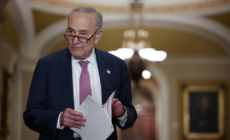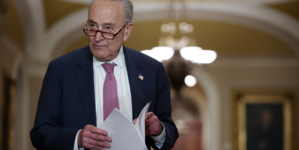-
More than 1,600 immigrants detained in Southern California this month - 14 mins ago
-
Extreme Heat Is Breaking America - 32 mins ago
-
Trump Rips Zohran Mamdani After NYC Primary Triumph: ‘Communist Lunatic’ - 37 mins ago
-
Chuck Schumer Taken to Hospital for Treatment—What We Know - about 1 hour ago
-
Trump Administration Says California’s Trans Sports Policies Discriminate Against Girls - about 1 hour ago
-
Pasadena mayor’s keepsake, a coffee can, is a reminder of when his family was undocumented - 2 hours ago
-
Usha Vance Opens Up About Family Life in Rare Interview - 2 hours ago
-
Why Did the Novel-Reading Man Disappear? - 2 hours ago
-
How to Watch Borussia Dortmund vs Ulsan Hyundai: Live Stream FIFA Club World Cup, TV Channel - 2 hours ago
-
Trump Says He May Send Additional Patriot Systems to Ukraine - 3 hours ago
Missouri Abortion Ban Faces Lawsuit After Voters Approve Ballot Measure
Missouri’s abortion ban faces a new lawsuit after voters on Tuesday approved a ballot measure that could roll back the current ban on abortions.
In a sweeping move following Tuesday’s election, abortion rights advocates celebrated seven notable wins across the U.S. on reproductive rights ballot measures. However, they lost on three ballot measures, which marked the first losses since the Supreme Court overturned Roe v. Wade in 2022.
What Happened in Missouri?
Missourians voted on Tuesday to legalize abortion up until fetal viability and override the state’s current ban on nearly all abortion, as the amendment enshrines abortion rights into the constitution.
Missouri was the first state to ban abortion, even in cases of rape and only with an exception for medical emergencies, after Roe v. Wade was overturned. In addition, clinics, burdened by extensive regulations, ceased providing abortions.
In response, abortion rights proponents gathered hundreds of thousands of signatures for a vote on Amendment 3 to legalize abortion up to fetal viability, which is around 24 weeks.

Charlie Riedel/AP
What is the lawsuit?
Following Tuesday’s election, Planned Parenthood of the Great Plains filed a lawsuit in a state court Wednesday seeking to invalidate Missouri’s abortion ban and several laws that regulate the care.
This comes as the amendment, set to take effect December 5, doesn’t automatically override existing laws, placing the onus on advocacy groups to push for judicial intervention to restore abortion access.
In its legal filing, the Planned Parenthood affiliate objected to requirements such as clinicians who provide abortion must have have surgical licenses and that they conduct pelvic exams on all patients—even if they offer only medication abortions.
“Some of these patients choose medication abortion precisely because they do not want instruments inserted into their vagina,” Dr. Selina Sandoval, an associate medical director for the Planned Parenthood group said in a legal filing. “I cannot and will not subject my patients to unnecessary exams.”
The challenge also targets regulations such as the 72-hour waiting period and a telemedicine abortion ban.
Other States on Abortion Rights
Abortion rights proponents point to their ballot successes as evidence of widespread voter support, despite defeats in Florida, South Dakota and Nebraska, where unique obstacles influenced outcomes.
In Florida, for example, Republican Governor Ron DeSantis actively opposed the measure, redirecting state GOP funds and bolstering state agencies’ anti-abortion messaging, all of which contributed to the amendment’s shortfall despite majority support as the threshold for passing a constitutional amendment is 60 percent while most states require a simple majority.
In South Dakota, the measure would have allowed the state to regulate abortion in the second trimester, but only in ways that protect the health of the woman. Due to the provision, national abortion rights organizations withheld funding for promoting it, citing a lack of focus on broader reproductive health issues.
Meanwhile, in Nebraska, a competing anti-abortion measure further complicated voter choices, an approach anti-abortion advocates may replicate in other states.
Trump Presidency’s Potential Impact
With Donald Trump returning to the White House, abortion policy could face a federal shift. Trump’s evolving stance on abortion leaves ambiguity over whether he would enact a national ban. Trump has said he would veto a national ban, despite previously declining to answer questions about it.
Still, his judicial appointments have already reshaped abortion policy, and he has previously taken credit for appointing three justices to the U.S. Supreme Court who helped form the majority that overturned Roe v. Wade.
This article includes reporting from The Associated Press.
Source link




















